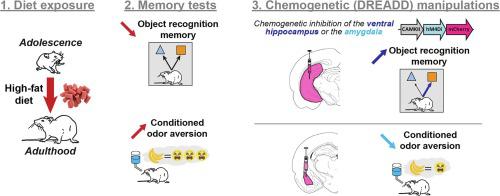Neurobiology of Learning and Memory ( IF 2.7 ) Pub Date : 2020-12-02 , DOI: 10.1016/j.nlm.2020.107354 Fabien Naneix 1 , Ioannis Bakoyiannis 2 , Marianela Santoyo-Zedillo 3 , Clémentine Bosch-Bouju 2 , Gustavo Pacheco-Lopez 4 , Etienne Coutureau 5 , Guillaume Ferreira 2 ,

|
In addition to numerous metabolic comorbidities, obesity is associated with several adverse neurobiological outcomes, especially learning and memory alterations. Obesity prevalence is rising dramatically in youth and is persisting in adulthood. This is especially worrying since adolescence is a crucial period for the maturation of certain brain regions playing a central role in memory processes such as the hippocampus and the amygdala. We previously showed that periadolescent, but not adult, exposure to obesogenic high-fat diet (HFD) had opposite effects on hippocampus- and amygdala-dependent memory, impairing the former and enhancing the latter. However, the causal role of these two brain regions in periadolescent HFD-induced memory alterations remains unclear. Here, we first showed that periadolescent HFD induced long-term, but not short-term, object recognition memory deficits, specifically when rats were exposed to a novel context. Using chemogenetic approaches to inhibit targeted brain regions, we then demonstrated that recognition memory deficits are dependent on the activity of the ventral hippocampus, but not the basolateral amygdala. On the contrary, the HFD- induced enhancement of conditioned odor aversion specifically requires amygdala activity. Taken together, these findings suggest that HFD consumption throughout adolescence impairs long-term object recognition memory through alterations of ventral hippocampal activity during memory acquisition. Moreover, these results further highlight the bidirectional effects of adolescent HFD on hippocampal and amygdala functions.
中文翻译:

海马和杏仁核的化学遗传沉默揭示了青春期肥胖饮食诱导的记忆改变的双重分离
除了许多代谢合并症外,肥胖还与一些不良的神经生物学结果有关,尤其是学习和记忆的改变。肥胖患病率在青年时期急剧上升,并在成年期持续存在。这尤其令人担忧,因为青春期是某些在记忆过程中发挥核心作用的大脑区域(如海马体和杏仁核)成熟的关键时期。我们之前表明,青春期而非成人暴露于致肥胖高脂肪饮食 (HFD) 对海马和杏仁核依赖性记忆具有相反的影响,损害前者并增强后者。然而,这两个大脑区域在青春期 HFD 诱导的记忆改变中的因果作用仍不清楚。在这里,我们首先表明青春期 HFD 诱导长期,但不是短期,物体识别记忆缺陷,特别是当大鼠暴露于新环境时。使用化学遗传学方法来抑制目标大脑区域,然后我们证明了识别记忆缺陷取决于腹侧海马体的活动,而不是基底外侧杏仁核的活动。相反,HFD 诱导的条件性气味厌恶的增强特别需要杏仁核活动。综上所述,这些发现表明,整个青春期的 HFD 消费会通过记忆获取过程中腹侧海马活动的改变来损害长期物体识别记忆。此外,这些结果进一步强调了青少年 HFD 对海马和杏仁核功能的双向影响。使用化学遗传学方法来抑制目标大脑区域,然后我们证明了识别记忆缺陷取决于腹侧海马体的活动,而不是基底外侧杏仁核的活动。相反,HFD 诱导的条件性气味厌恶的增强特别需要杏仁核活动。综上所述,这些发现表明,整个青春期的 HFD 消费会通过在记忆获取过程中改变腹侧海马活动来损害长期物体识别记忆。此外,这些结果进一步强调了青少年 HFD 对海马和杏仁核功能的双向影响。使用化学遗传学方法来抑制目标大脑区域,然后我们证明了识别记忆缺陷取决于腹侧海马体的活动,而不是基底外侧杏仁核的活动。相反,HFD 诱导的条件性气味厌恶的增强特别需要杏仁核活动。综上所述,这些发现表明,整个青春期的 HFD 消费会通过记忆获取过程中腹侧海马活动的改变来损害长期物体识别记忆。此外,这些结果进一步强调了青少年 HFD 对海马和杏仁核功能的双向影响。相反,HFD 诱导的条件性气味厌恶的增强特别需要杏仁核活动。综上所述,这些发现表明,整个青春期的 HFD 消费会通过记忆获取过程中腹侧海马活动的改变来损害长期物体识别记忆。此外,这些结果进一步强调了青少年 HFD 对海马和杏仁核功能的双向影响。相反,HFD 诱导的条件性气味厌恶的增强特别需要杏仁核活动。综上所述,这些发现表明,整个青春期的 HFD 消费会通过记忆获取过程中腹侧海马活动的改变来损害长期物体识别记忆。此外,这些结果进一步强调了青少年 HFD 对海马和杏仁核功能的双向影响。



























 京公网安备 11010802027423号
京公网安备 11010802027423号